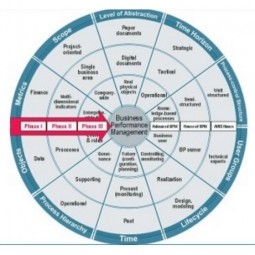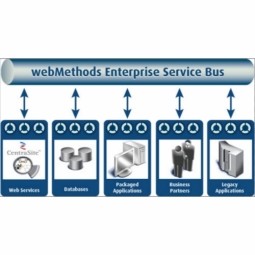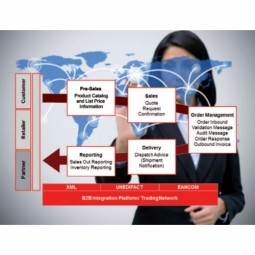Case Studies.
Our Case Study database tracks 18,927 case studies in the global enterprise technology ecosystem.
Filters allow you to explore case studies quickly and efficiently.
-
(201)
- (145)
- (114)
- (33)
- View all
-
(110)
- (60)
- (37)
- (26)
- View all
-
(94)
- (57)
- (25)
- (11)
- View all
-
(16)
- (14)
- (1)
- (1)
- View all
-
(10)
- (7)
- (3)
- (1)
- View all 11 Technologies
- (55)
- (24)
- (21)
- (21)
- (18)
- View all 33 Industries
- (156)
- (70)
- (53)
- (43)
- (38)
- View all 11 Functional Areas
- (96)
- (63)
- (62)
- (62)
- (37)
- View all 62 Use Cases
- (242)
- (126)
- (60)
- (42)
- (19)
- View all 6 Services
- (301)
Selected Filters
301 case studies
|
Coca-Cola Refreshments, U.S.
Software AG
Coca-Cola Refreshments owns and manages Coca-Cola branded refrigerators in retail establishments. Legacy systems were used to locate equipment information by logging onto multiple servers which took up to 8 hours to update information on 30-40 units. The company had no overall visibility into equipment status or maintenance history.
|
|
PREDICTIVE MAINTENANCE
Software AG
Manufacturers rightly focus on improving profit margins and growing revenue. Attracting new customers, selling more products and lean practices can help. However, as equipment sophistication increases, so does the ability to monitor equipment. Manufacturers can now develop revenue from maintenance services. Preventive maintenance has its advantages but to really drive uptime and maintain service levels, predictive maintenance is needed. Seamless IoT and machine sensor data integration is critical as well as a low-latency messaging backbone for scalable, fast and reliable transport. Delivering potentially large quantities of data at sub-second speeds is key to downstream activities. webMethods Integration, featuring Universal Messaging, addresses this need with an enterprise-grade service bus for connectivity, messaging, transformation and security of machine data for advanced real-time analytics.
|
|
Software AG - Market Operator Enhances Australia Energy Future
Software AG
AEMO needed to modernize of the Gas FRC Hub a B2B platform for the gas retail markets throughout Australia and provide a reliable B2B platform that could scale to support the adoption of B2B procedures in New South Wales (NSW).
|
|
Setting a New Pace for Increased Competitive Advantage
Software AG
Fujitsu needed a solution that would provide greater flexibility for user interfaces, facilitate improvements in its 24/7 support, enable faster on-boarding of customers and increase cost efficiencies. Fujitsu also needed continuous availability throughout the transition process due to demanding Service Level Agreements (SLAs) and high penalties.
|
|
Scalable IoT Empowering GreenFlex's Sustainable Growth
Software AG
GreenFlex, a company that supports sustainable development, decarbonization, and energy efficiency, faced several challenges in its quest to expand its business. The company needed to deploy a robust and sustainable IoT technology to support its growth. It was crucial for them to monitor and control devices at customer sites in a safe and reliable manner. They also needed to integrate devices across a range of communication protocols and gather and act on data to meet efficiency targets. GreenFlex had previously built IoT capabilities into its digital platform, GreenFlexIQ, to monitor and manage customer sites remotely. However, they soon realized that they needed a new platform to support their ambitions. They needed a platform that could scale to connect more devices for production management and make it easier for the operations team to manage devices in the field.
|
|
Accelerating Enterprise Digitalization: Deutsche Telekom’s Cloud of Things IoT Platform
Software AG
Deutsche Telekom, a global leader in Machine-to-Machine (M2M) and Internet of Things (IoT) communications, was faced with the challenge of quickly establishing a presence in the fast-paced IoT market. The company needed to find a technology partner that could provide a fully rebrandable platform to launch a solution that could get customers up and running in minutes. Deutsche Telekom recognized that its enterprise customers, including Dürkopp Adler, Deutsche Afrika Linien, HUBTEX, and Definitiv, needed to transform their businesses to remain globally competitive and innovative. The company aimed to simplify IoT adoption and enable its enterprise customers to efficiently implement end-to-end IoT solutions. This would allow these businesses to increase end-customer service levels and customer satisfaction, lower operational costs, and transition from product-centric to service-centric companies.
|
|
Optimizing Business Operations with IoT: A Compilation of Case Studies
Software AG
The case study compilation presents a variety of challenges faced by different organizations across various sectors. Medical Industrie GmbH & Co. KG needed to optimize and streamline their B2B sales. Bank Sinarmas needed to comply with Indonesian Open-API Standards and exploit the ecosystem economy. MUDUM required a platform to harness the power of the API-driven ecosystem economy. OCP Group needed to standardize their APIs. Al Barid Bank was in the process of digital transformation. Marsa Maroc needed to digitalize its business workflows. PharmLog required an integration platform for seamless pharma logistics. Lufthansa Technik AG needed a B2B integration environment for standardized customer engagement. Socomec needed a hybrid integration tool to boost security and improve efficiency. Hellmann needed to integrate more than 750 application interfaces and over 500 customers.
|
|
Optimizing Business Operations with IoT: A Compilation of Case Studies
Software AG
The case study compilation presents a variety of challenges faced by different organizations across various industries. Medical Industrie GmbH & Co. KG needed to optimize and streamline their B2B sales. Bank Sinarmas needed to comply with Indonesian Open-API Standards and exploit the opportunities of the ecosystem economy. MUDUM was looking to harness the power of the API-driven ecosystem economy. OCP Group needed to standardize their APIs. Al Barid Bank was undergoing a digital transformation and needed to strengthen its position as an inclusive bank. Marsa Maroc was looking to advance the digitalization of its business workflows. PharmLog needed an integration platform solution that improves their overall efficiency and creates maximum transparency. Lufthansa Technik AG needed a B2B integration environment that standardized customer engagement. Socomec needed to boost security, improve efficiency, and achieve total visibility over its business workflows. Hellmann needed to integrate more than 750 application interfaces and over 500 customers.
|
|
Saudi Telecom Company‘S SOA Journey
Software AG
STC, the major provider of telecommunication services in Saudi Arabia, was facing a rapidly changing business environment characterized by volatility and the need for new and innovative business models. Globalization was impacting the telecom industry as a whole and, in addition, technologies were converging, customers were becoming more highly educated and expressed demands that were both increasing in scope and diversity. Telecom companies, therefore, needed to invest in new and rapidly evolving technologies while at the same time deal with the commoditization of their products and services. Customer volatility and regulatory pressures were also compounding this competitive situation. Winning and retaining customers today is about service excellence and as prices point are lowered so are the entry points into these industries by competitors. To combat this, telecom enterprises are shifting their focus from growth to efficiency.
|
|
Cargolux Takes Off into A Successful Future
Software AG
Cargolux Airlines S.A. was in a strong market position with impressive sales and constant profit figures when the top management decided to run a “health check” on the company’s processes. Management perceived inefficiencies with the organization and IT spending was not optimized to support it. “In addition, management felt that internal groups sometimes had different versions of the truth and decision makers were having trouble gathering the information they needed in a timely manner. Finally, over time each business unit had started to run their own systems and created databases that sometimes competed with each other. The risk of duplicated and unclear ownership of tasks had become too high.” Cargolux started to look for a way to streamline its processes and provide the foundation for creating a service-oriented systems architecture.
|
|
CENIBRA: Achieving Sustainable Growth through SAP Process Transformation
Software AG
CENIBRA, a major producer of bleached eucalyptus pulp based in Brazil, was facing several challenges. The company had a desire to transition from its legacy ERP system to SAP S/4HANA, but was struggling with establishing SAP standards to save time and money. The company also lacked process clarity for its complex supply chain management and was struggling to establish a single source of truth. There was a misalignment between the business and IT, and a demand for control and security for the company’s forestry process cycle. The increasing market demand and the need for modernization of IT systems made it clear that the company wasn’t keeping pace. Upgrading to SAP S/4HANA was a necessary step towards a modern IT infrastructure, but there was a risk of the cycle breaking down during the upgrade.
|
|
BOK Financial Saves Millions of Dollars A Year with Paperless Check Processing
Software AG
The Check Clearing for the 21st Century Act became U.S. law in 2004 so banks could process more checks electronically. Before this act, banks had to physically transport paper checks from where they were deposited to the bank that paid them. Now, instead, banks can process checks faster and more efficiently using digital images. BOK Financial saw this as a business opportunity to gain efficiency. However, the process of integrating the digital check processing system was complex due to the numerous back-end operational systems involved in depositing, validating, and handling errors and closed accounts.
|
|
Taxes Collected 80% Faster with Software AG Solution
Software AG
The Department of the Treasury of the Commonwealth of Puerto Rico has three main applications for the collection and management of taxes: ARBITRIOS for the calculation of taxes, PRITAS for the management of corporate taxes and REFO for processing individual taxes. The challenge is to provide a single view of the taxpayer through a Web portal that integrates data from all three main systems. The Treasury Department was looking for the tools to carry out an application integration, which would allow the agency to have a single view of the taxpayer through a Web portal. This new integration platform was also needed to provide higher efficiency in managing department records. The solution would have to maintain and improve existing investments, re-using the Natural and COBOL application code. The solution also would need to support a technological evolution—rather than a revolution that would completely alter existing IT assets.
|
|
Bossini Advances Its Supply Chain Strategy with the Webmethods ESB
Software AG
To keep ahead in the fast-moving fashion industry, Bossini wanted to have better visibility into its business and operational processes by synchronizing real-time data across multiple orders, shipments and stock-keeping units (SKUs). However, the data resided in a number of systems, from point-of-sale (POS) solutions to Bossini’s warehouse management inventory. In order to achieve its goals, Bossini had to integrate a series of platforms including the old and new versions of its Oracle application and the company’s legacy platform. During the transition from legacy system to SOA, the company’s different platforms had to be integrated. Other applications like the company’s new POS system had to be connected not only to its new Warehouse Management System (WMS), but also to the old POS because the company was still in the midst of systems migration.
|
|
Water companies detect leaks, reduce costs with Telstra & Software AG
Software AG
Water leaks, poor metering, and tampering of water supplies are leading to wastage and shortages worldwide. In Australia, one of the world’s driest countries, every drop matters even more. The Goldfields pipeline, a 600-kilometer pipeline that sends water from Perth to 100,000 people around Western Australia, is suffering from endemic leaks and burst pipelines. The World Bank estimates that more than 126 million cubic meters of water is lost each year globally—at a cost of over $40 billion. As a utility, if you cannot rein in leaks and control the flow, quality and reliability of your supplies, you are at risk of penalties, fines and—even worse—reputational damage leading to loss of business.
|
|
Re-Engineered Business Processes Improve Internal Control Auditing
Software AG
Poste Italiane operates across many lines of business, including postal, banking, insurance and financial services. As a result, this diverse enterprise is subject to many different laws and regulations. The company is also widespread with 154,000 employees in 14,000 offices and 16 subsidiaries. This is why a traditional audit approach based on simple testing for each subsidiary or location simply wouldn’t work. As a diverse enterprise, Poste Italiane has to comply with a wide range of laws and regulations issued by the European Union, the Italian Parliament and other authorities. Because of these different regulations— combined with the company’s dispersed structure—Poste Italiane was unable to use a traditional audit procedure based on testing. Instead, Poste Italiane opted for an integrated and methodical approach focused on control design and system reliability.
|
|
Baker Hughes Drills into Webmethods to Reduce Process Time and Costs
Software AG
Baker Hughes, a top-tier oilfield service company, wanted to optimize its Procure-to-Pay (P2P) process to improve invoice accuracy, minimize delivery delays, and reduce late payments. The company needed a world-class Business Process Management (BPM) solution to increase process agility, visibility, and control. The company was looking for a solution that could provide real-time metrics and alerts for process abnormalities, reduce invoice errors and payment delinquency rates, and save costs on every invoice.
|
|
Unifying Process Architecture: Alicorp's Journey with ARIS
Software AG
Alicorp, a leading food processing company in Latin America, faced several challenges in its ambitious 2025 roadmap. The company needed to unify technologies and processes across its four complex business lines. There was a demand for standardization and automation of processes across all geographies and subsidiaries. However, Alicorp struggled with a lack of process visibility, both internally and externally. The company also found it challenging to find an open process management platform that could integrate with its new SAP migration. The company's accelerated growth over the years had resulted in operational complexity, with different tech solutions solving local problems, new applications serving global customers, and system mergers following numerous acquisitions.
|
|
Advanced Analytics for the Factory of the Future: A Case Study on Ashland Manufacturing
Software AG
Ashland Manufacturing, a $5 billion US-based provider of specialty chemical solutions, was facing a series of challenges. The company was shifting its focus from construction materials to pharmaceuticals, a transition that brought about new challenges. This shift required higher added value, lower product throughput, and more control over production processes. The company was also dealing with seemingly 'unsolvable' production issues and a need for operational efficiency to boost quality and profitability. There was also pressure to increase Good Manufacturing Practice (GMP) production throughput. Furthermore, the company had to navigate the new territory of strict GMP standards relating to pharmaceutical product quality.
|
|
Australian Unity: Enhancing Customer Wellbeing through Open Integration and API Management
Software AG
Australian Unity, a leading provider of health, wealth, and care products and services, faced several challenges. The company had a directive to migrate critical on-premises applications to the cloud. They also needed a single source of truth across their complex, diverse business portfolio. The company desired to automate their complex membership rules process and felt the pressure to enable secure file transfer across the business. The company's diverse range of products and services necessitated an investment in IT to deliver what matters to its customers and members. Australian Unity needed a solution that could unlock data held in silos across numerous legacy systems and connect it to release its true value.
|
|
Autosen's Innovative Sensor-to-Cloud Solution: A Case Study
Software AG
Autosen, an online sales platform for sensor and automation solutions, faced several challenges in its quest to digitalize SMEs and the industrial sector. The company aimed to create a sensor-to-cloud process that was quick, easy, and cost-effective. They wanted to enable entry to the Industrial Internet of Things (IIoT) for all industries and provide access to new digital business models. Additionally, they sought to expand the potential for sensor data in the cloud. Traditional methods of transferring sensor data into the cloud involved high costs and extensive technical effort, posing a significant dilemma for many industrial companies.
|
|
AXA Cooperative Insurance's API-led Transformation with webMethods
Software AG
AXA Cooperative Insurance, a subsidiary of AXA Group and one of the largest insurance providers in Saudi Arabia, faced several challenges. The company was dealing with an ambitious back-end transformation, growing demands from regulators, an increasingly competitive insurance marketplace, and a legacy integration system in need of modernization. The company's success was increasingly tied to its ability to harness data to instantly generate quotes for new customers and keep on top of ever-stringent regulations. However, its IT systems were not up to the task. The complex and ever-growing application landscape was barely held together by a web of rigid point-to-point connections. Legacy applications frequently went down due to lack of maintenance, and new ones lacked the ability to share data with industry partners in a secure, efficient manner. Furthermore, AXA’s data wasn’t even stored inside the country, instead, it was scattered across servers in Dubai, Spain, and France.
|
|
Digital Transformation of Microfinance: A Case Study of Bank Rakyat Indonesia
Software AG
Bank Rakyat Indonesia (BRI), the largest national bank in Indonesia and the world's largest microfinance institution, faced several challenges in its quest to digitalize transactions and meet rapidly changing customer needs. The bank's complex architecture, which included over 200 different systems and multiple middleware platforms, made it difficult to integrate, operate, and monitor new applications. This complexity also hindered the bank's ability to quickly bring new services to market. Furthermore, BRI needed to reduce costs on smaller, shorter-term loans, a key component of its microfinance offerings. The bank's existing technology had limited capabilities and performance, and could not support its new digital banking initiative.
|
|
Revolutionizing Process Management in Real Estate and Medical Equipment Industry: A Case Study of Sichuan Languang Development Co., Ltd. (BRC)
Software AG
Sichuan Languang Development Co., Ltd. (BRC), a company with over 20,000 employees and 390+ enterprises, was facing significant challenges in managing its vast documentation. The company had over 8,000 documents about systems, processes, specifications, and guidelines that were not updated in a timely manner. This lack of organization and timely updates impacted the implementation of systems, affecting workers' efficiency. Additionally, training new employees was a time-consuming process due to the scattered and unorganized training materials. The company needed to coordinate the participation of business personnel from multiple departments, which was difficult to control. This often resulted in confusion and a slow start for new employees.
|
|
Carnival Cruise Line: Enhancing Customer Experience through IoT Integration
Software AG
Carnival Cruise Line, a leading global cruise company, faced several challenges in managing its worldwide travel partner integrations with reservation systems and shipboard service partner integrations with onboard property management and POS systems. The company also struggled with synchronizing data from shore to ship pre-cruise and ship to shore post-cruise. The need to decouple and empower integrations to minimize turnaround time was also a significant challenge. The company's operations spanned across multiple hosting environments, applications, and platforms, making the integration process complex. The company also faced unique maritime challenges, such as costly and less reliable satellite connectivity, which required the ships to operate as autonomous IT centers.
|
|
Unleashing Unlimited Agility with APIs and Integration: A Case Study on Clal Insurance
Software AG
Clal Insurance, a leading insurance and pension company in Israel, was facing a multitude of challenges. The insurance industry in Israel had become extremely competitive due to the influx of new InsurTech startups aiming to disrupt the market. This put Clal, a 34-year industry veteran, in a position where it needed to react quickly to outpace these startups, a task made difficult by the vast amount of data tied up in older systems. Additionally, Clal was grappling with a global financial crisis, aggressive changes in the regulatory landscape, and the challenge of low-to-zero interest rates. The company was also dealing with manual applications, growing SLA compliance risks, and rising business costs. To stay competitive and meet SLA requirements, Clal needed to innovate and adapt to these changing market conditions.
|
|
Empowering Choice for Disabled Individuals: A Digital Transformation Journey
Software AG
The Council of Australian Governments (COAG) reformed the provision of disability services across Australia in 2011, resulting in a high-performing organization that supports almost 467,000 affected people across two territories and six states with personalized services. However, the organization faced several challenges. There was a lack of digitalized process documentation, and the processes varied across all six states. The IT department was under pressure to have a process architecture fit for the new purpose. There was a need to improve and scale process efficiency, but the inability to define the future state due to lack of visibility of the current state was a significant hurdle. The organization also needed to focus on the business need for a better client experience.
|
|
Driving Social Action Through Integration: The Case of Seine-Maritime Department
Software AG
The Department of Seine-Maritime, the fifteenth largest in France, was facing challenges in automating its financial and human resources processes. The department, which is responsible for social action in the region, was struggling with manual processes such as the transmission of checks, bundles of documents, and liquidation statements. The department was also looking to implement an interface between its financial management solution and the human resources management solution to automate document processes and payments. The department was seeking a solution that could create interfaces between the different business applications to streamline and secure its financial and payment processes, simplify human resources processes, and reduce its environmental impact.
|
|
IIoT Analytics Revolutionizing the Automotive Painting Industry: A Case Study on Dürr
Software AG
Dürr, a leading mechanical and plant engineering firm, faced several challenges in its operations. The company was under pressure to meet customer demand for secure monitoring of production data and self-service predictive maintenance capabilities. There was also a need to avoid painting faults caused by materials or equipment wear. Dürr was also grappling with growing ESG requirements to cut energy use and emissions. The company was in the process of transforming from traditional manufacturing to a digital business, which presented its own set of challenges.
|
|
Dürr Group's Infrastructure Integration with webMethods: A Case Study
Software AG
The Dürr Group, a leading mechanical and plant engineering firm, faced several challenges in aligning its IT with its company-wide OneDürrGroup strategy. The company's consistent expansion and diverse customer base resulted in a complex IT infrastructure, characterized by different integration solutions and a hybrid application landscape. The company aimed to implement its OneDürrGroup strategy across all locations and divisions, which naturally impacted its own IT. The diverse range of solutions—on-premises, Integration-Platform-as-a-Service (iPaaS) and Software-as-a-Service—meant more cost and effort and required more expertise in different technologies, as well as a mass of redundant interfaces. The company believed that an integrated architecture could achieve significant streamlining in the HR landscape alone.
|








